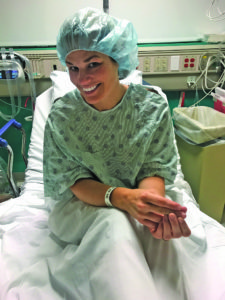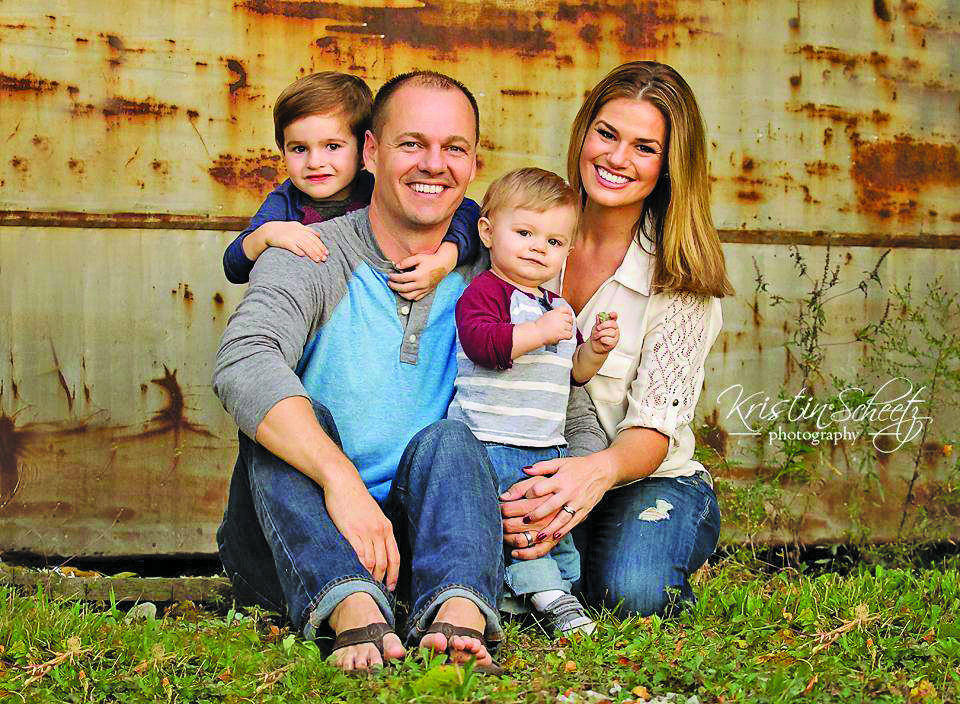By Raiza Giorgi
Election Day is a huge day for news reporters, who scramble to let viewers and readers know the results of voting in multiple races.
On that day in November 2008, Santa Ynez Valley native Joy Lambert was working for a television station in Alabama when she got a phone call that changed her life. She had tested positive for the BRCA breast cancer gene, the same malady that became widely known after actress Angelina Jolie tested positive for it and chose to have a double mastectomy to avoid developing cancer.
“My whole life plan changed in an instant, and even though I haven’t developed cancer, I have spent a lot of time and given up parts of my body to ensure I don’t,” Lambert said.

Santa Ynez Valley native Joy Lambert is pictured just before her double mastectomy in September. Photo contributed
Lambert had double mastectomy surgery on Sept. 25 at John Hopkins University in Baltimore, where she lives with her husband Clint Jiras and their two sons. She and her husband work at the same news station and have been documenting their journey.
The surgery went well and as she recovers, Lambert said, she is looking forward to the next chapter of her life.
“I am a ‘previvor,’ and doing everything in my power to stay healthy. My mom was 34 when she was first diagnosed and I am lucky that she will be here with me as I undergo this surgery,” Lambert said.
Women who have inherited mutations in these genes are at an increased risk of developing breast cancer and ovarian cancer compared with the general population.
Lambert went through a hysterectomy when she was 31 after having her second child.
“My husband has been the most amazing through this. Even before we were dating I told him about my plans and he has stuck with me through everything. These decisions aren’t made lightly, and he has always encouraged me,” Lambert said.
“Joy has this amazing perspective that makes this entire process easier in our case. We are hoping that her story can be shared and more women can get tested. The first surgery was hard and I was definitely scared of the unknown, but watching her in the backyard right now with our two boys makes this all worth it,” Jiras said.
The BRCA gene increases the risk of developing breast cancer from 8 percent to 65 percent and ovarian cancer from less than 2 percent to 70 percent. Since there still aren’t great screening methods for ovarian cancer, the removal of the ovaries and fallopian tubes are often recommended for women who carry this gene, according to the Mayo Clinic.
Lambert says telling her story publicly is cathartic for her, and she also hopes it will inspire other women to get tested.
“I was really alone when I found out. I thought I was the only one around me, and I wasn’t. I don’t want any other woman to feel that way … and know there is support out there and things you can do to prevent getting cancer,” she said.
+++++++++++++++++++++++++++++++++++++++++++++++++++
Decision on BRCA testing can be a difficult one
Staff Report
The first step in the BRCA gene testing process is to meet with a genetic counselor, who takes a detailed family and medical history, assesses your risk of developing cancer, discusses risks and benefits of genetic testing, and outlines the options, according to the Mayo Clinic.
If you decide to proceed with the BRCA genetic test, prepare yourself for the emotional and social implications that learning your genetic status might have. Test results could also fail to provide you with clear-cut answers regarding your cancer risk, so prepare to face that possibility, too.
The BRCA gene test is most often a blood test. The blood sample goes to a lab for DNA analysis.
In some cases, other sample types are collected for DNA analysis, including saliva. If you have a family history of cancer and are interested in pursuing a saliva DNA test, discuss it with your doctor. He or she can refer you to a genetic counselor who can determine the most appropriate sample type for genetic testing.
It takes several weeks before test results are available. You meet with your genetic counselor to learn your test results, discuss their implications and go over your options. Federal and state laws help ensure the privacy of genetic information and protect against discrimination in health insurance and employment.







